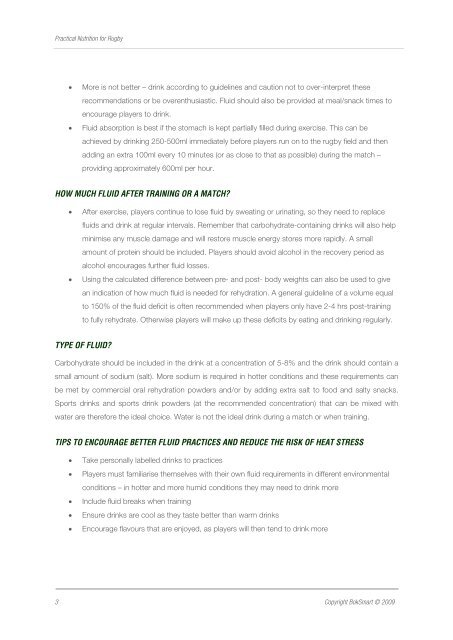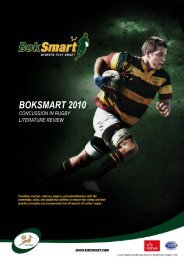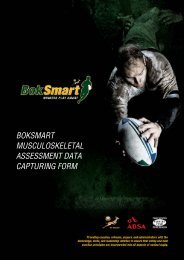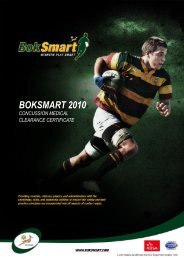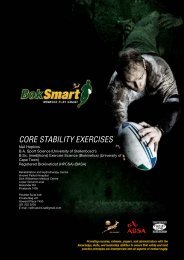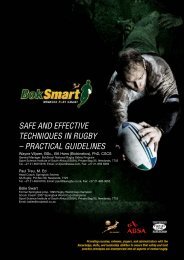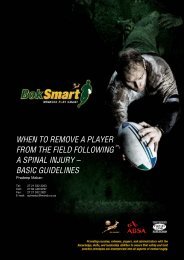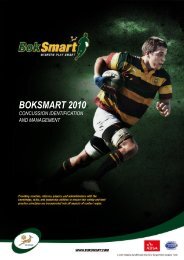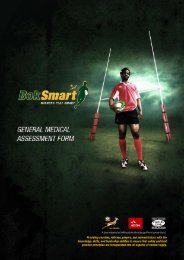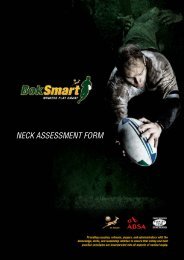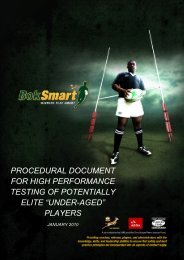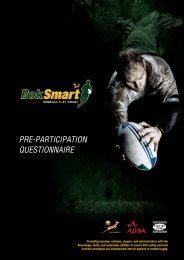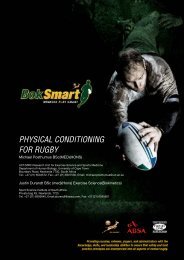FRONT PAGE HEADING PRACTICAL NUTRITION FOR ... - SA Rugby
FRONT PAGE HEADING PRACTICAL NUTRITION FOR ... - SA Rugby
FRONT PAGE HEADING PRACTICAL NUTRITION FOR ... - SA Rugby
Create successful ePaper yourself
Turn your PDF publications into a flip-book with our unique Google optimized e-Paper software.
Practical Nutrition for <strong>Rugby</strong><br />
• More is not better – drink according to guidelines and caution not to over-interpret these<br />
recommendations or be overenthusiastic. Fluid should also be provided at meal/snack times to<br />
encourage players to drink.<br />
• Fluid absorption is best if the stomach is kept partially filled during exercise. This can be<br />
achieved by drinking 250-500ml immediately before players run on to the rugby field and then<br />
adding an extra 100ml every 10 minutes (or as close to that as possible) during the match –<br />
providing approximately 600ml per hour.<br />
HOW MUCH FLUID AFTER TRAINING OR A MATCH?<br />
• After exercise, players continue to lose fluid by sweating or urinating, so they need to replace<br />
fluids and drink at regular intervals. Remember that carbohydrate-containing drinks will also help<br />
minimise any muscle damage and will restore muscle energy stores more rapidly. A small<br />
amount of protein should be included. Players should avoid alcohol in the recovery period as<br />
alcohol encourages further fluid losses.<br />
• Using the calculated difference between pre- and post- body weights can also be used to give<br />
an indication of how much fluid is needed for rehydration. A general guideline of a volume equal<br />
to 150% of the fluid deficit is often recommended when players only have 2-4 hrs post-training<br />
to fully rehydrate. Otherwise players will make up these deficits by eating and drinking regularly.<br />
TYPE OF FLUID?<br />
Carbohydrate should be included in the drink at a concentration of 5-8% and the drink should contain a<br />
small amount of sodium (salt). More sodium is required in hotter conditions and these requirements can<br />
be met by commercial oral rehydration powders and/or by adding extra salt to food and salty snacks.<br />
Sports drinks and sports drink powders (at the recommended concentration) that can be mixed with<br />
water are therefore the ideal choice. Water is not the ideal drink during a match or when training.<br />
TIPS TO ENCOURAGE BETTER FLUID PRACTICES AND REDUCE THE RISK OF HEAT STRESS<br />
• Take personally labelled drinks to practices<br />
• Players must familiarise themselves with their own fluid requirements in different environmental<br />
conditions – in hotter and more humid conditions they may need to drink more<br />
• Include fluid breaks when training<br />
• Ensure drinks are cool as they taste better than warm drinks<br />
• Encourage flavours that are enjoyed, as players will then tend to drink more<br />
3 Copyright BokSmart © 2009


